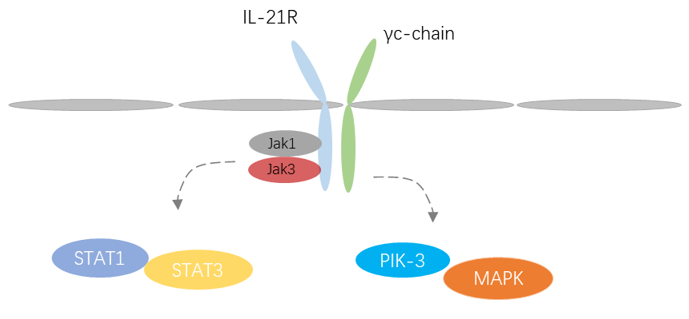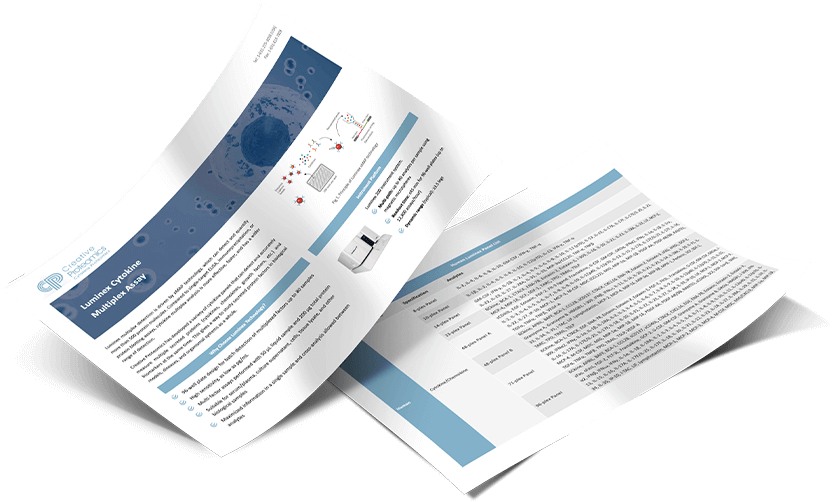Introduction
Interleukin-21 is a type I cytokine, mainly secreted by activated CD4+ T cells and natural killer (NK) cells, and belongs to the IL-2 family. IL-21 can mediate a variety of biological effects. For example, IL-21 has effects on B, T lymphocytes and NK cells at different stages. In the presence of specific stimuli, it can promote the growth and proliferation, of B, T cells and NK cells. It can also up-regulate the secretion of IFN-γ and other cytokines, induce apoptosis and exert tumor activity.
Mechanism and Function
IL-21R is a complex composed of a unique IL-21R subunit and γc (γ-chain). Among them, the IL-21R subunit is the ligand recognition binding site, and γc is the signal transduction unit. IL-21R is mainly distributed in lymphatic tissues, including spleen, thymus, lymph nodes and peripheral blood lymphocytes, and can also be expressed in B, T cells and NK-derived cell lines. After IL-21 binds to its receptor IL-21R, it can activate Jak1 and Jak3 of the Jak family. Jak1 and Jak3 activate transcription factors STAT1 and STAT3, and weakly activate STAT4 and STAT5. In addition, IL-21 can also conduct signal transduction through phosphoinositide kinase (PI3-K) and mitogen-activated protein kinase (MAPK) pathways.
IL-21 can participate in a variety of biological effects. In human primitive B cells, IL-21 can enhance anti-CD40-mediated proliferation and inhibit anti-immunoglobulin M (IgM) and IL-4 induced proliferation. IL-21 is a factor for the growth and survival of myeloma cells. IL-21 can induce phosphorylation of STAT1 and STAT3, of which STAT1 is a tumor suppressor. In addition, IL-21 can also regulate NK cells. It promotes the proliferation, differentiation and maturation of human bone marrow-derived NK cells, as well as enhances the cytotoxic activity of activated NK cells. At the same time, it can also promote the growth of CD8+ T cells, proliferate and enhance the cytotoxic function of CD8+ T cells. IL-21 can also regulate dendritic cells. Besides, IL-21 can promote the development of dendritic cells (DC) derived from bone marrow hematopoietic stem cells, but inhibit the maturation of DCs. It can cause DCs to reduce the expression of MHC type II molecules and reduce antigen delivery. It presents a role to limit the immune response of T cells from the antigen, thereby reducing and ending the immune response.
There are also links between IL-21 and many diseases. It can regulate inflammatory bowel disease. IL-21 stimulates intestinal epithelial cells to enhance the intestinal extra cellular signal-regulated kinase ERL1/2 and p38 and increase the synthesis of macrophage inflammatory protein MIP-3α. In the digestive tract, IL-21 can also enhance Th1 cell immune response and cause inflammation. IL-21 is also related to autoimmune diseases. It promotes the activation and proliferation of T lymphocytes and the secretion of proinflammatory cytokines by binding to its ligands, thereby inducing the onset of rheumatoid arthritis. In tumors, IL-21 can mediate the activation of CD8+ T cells to make them have anti-tumor activity. The increase in the expression of IL-21 in the inhibition of rejection reaction indicates that IL-21 is related to this. It can increase the killing activity of NK cells, thereby causing the damage of transplanted cells. IL-21 is also related to diabetes, its expression is up-regulated in type I diabetes, and it is involved in the pathogenesis of type I diabetes.
 Fig 1. Mechanism of Signaling
Fig 1. Mechanism of Signaling
Creative Proteomics can provide cytokine detection platform for scientific research. According to different purposes, our dedicated analysts will customize exclusive solutions for you. We aim to provide customers with high-quality and convenient services to help you accelerate the progress of your project.
Our cytokine detection service includes but is not limited to:
- Quantitative and qualitative detection of cytokines in different species
- Quantitative and qualitative detection of cytokine antibodies
- Quantitative and qualitative detection of single/multiple cytokines
Sample requirements
- Sample Types-Blood, serum, plasma, cerebrospinal fluid, cell culture supernatant, tissue homogenate, cell culture medium, urine, tumor, etc.
- Sample Volume-It is optimal for at least 200µl of each sample. This volume allows for triplicate testing of each sample.
Our advantages:
- Efficient design: Multiplex reaction detecting in various methods are available, which can be selected according to different samples and requirements.
- Sensitive detection: High-quality antibodies are used in the detection process to improve detection specificity and accuracy.
- Reliable results: The feedback results are professional and efficient.
Technology platform:
We mainly provide the Luminex cytokine detection platform. Luminex uses fluorescently encoded microspheres with specific antibodies to different target molecules. The different microspheres can be combined freely to a certain extent so that up to 100 analytes can be tested multiple times simultaneously in a single experiment.
The Luminex cytokine assay platform has the following advantages:
- Multiple detection: simultaneous detection of 100 biological targets
- Short experiment time: 1-3 weeks
- High sensitivity: the lower limit of accurate quantification is as low as 0.1 pg/mL
- Save samples: only need a sample volume as low as 25 μL
- Time saving: the experiment process only takes 4 hours
For your different needs, we can also provide the following detection methods:
- Enzyme-linked immunosorbent assay (ELISA)
- Flow cytometry
Workflow

For more information about the IL-21 detection service or need other detection requirements, please contact us.
References:
- Huang X, Yang W, Yao S, et al. IL-21 Promotes Intestinal Memory IgA Responses. The Journal of Immunology, 2020: ji1900766.
- Korn T, Bettelli E, Gao W, et al. IL-21 initiates an alternative pathway to induce proinflammatory T(H)17 cells. Nature, 2007, 448(7152):484-487.

